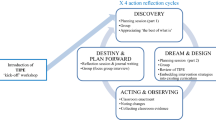Abstract
One way of understanding how to intervene in dysfunctional public discourse is to attend to the ways that we teach argument. This article contends that argument pedagogy would benefit from consideration of the process of argumentation, in which participants are prepared to enter into deliberation by attending to relationality. To ground their discussion, the authors present rhetorical praxis taught in two university sites and one public site.
Similar content being viewed by others
References
Adams, Brian. 2004. Public meetings and the democratic process. Public Administration Review 64: 43–54.
Brockriede, Wayne, and Douglas Ehninger. 1960. Toulmin on argument: An interpretation and application. Quarterly Journal of Speech 46: 44–63.
Eberly, Rosa A. 1999. From readers, audiences, and communities to publics: Classrooms as protopublic spaces. Rhetoric Review 18: 165–178.
Eodice, Michele, Anne Ellen Geller, and Neal Lerner. 2016. The meaningful writing project: Learning, teaching, and writing in higher education. Logan: Utah State University Press.
Green, Chris, and Julia Fabris McBride. 2015. Teaching leadership. Wichita: KLC Press.
Heifetz, Ronald. 1994. Leadership without easy answers. Cambridge: Belnap Press of Harvard University Press.
Heifetz, Ronald, Alexander Grashow, and Marty Linsky. 2009. The practice of adaptive leadership. Cambridge: Harvard Business Press.
Jamison, Kathleen Hall. 2018. Cyberwar: How Russian hackers and trolls helped elect a president. Oxford: Oxford University Press.
Kegan, Robert. 1982. The evolving self. Cambridge: Harvard University Press.
Keith, William. (2007). Democracy as Discussion: The American Forum Movement and Adult Civic Education. Lexington Books.
Keith, William. 2010. A new golden age: Intercollegiate debate in the 21st century. In Alan Louden (Ed.), Navigating opportunity: Policy debate in the 21st century (11-27). New York: IDEA Press. (F. Scott Fitzgerald, quoted in Esquire, February 1936,).
Keith, William, and Christian Lundberg. 2018. Public speaking: Choices and responsibility. Boston: Cengage.
Keith, William, and David Beard. 2008. Toulmin’s rhetorical logic: What’s the warrant for warrants? Philosophy and Rhetoric 41: 22–50.
Keith, William, and Roxanne Mountford. 2014. The Mt. Oread manifesto on rhetorical education: 2014. Rhetoric Society Quarterly 44: 1–4.
Kimball, Bruce. 1986. Orators and philosophers: A history of the idea of liberal education. New York: College Board.
O’Keefe, Daniel. 1977. Two concepts of argument. Journal of the American Forensic Association 13: 121–128.
Parks, Sharon. 2005. Leadership can be taught. Boston: Harvard Business School Press.
Ratcliffe, Krista. 2005. Rhetorical listening: Identification, gender, whiteness. Carbondale: Southern Illinois UP.
Tracy, Karen. 2010. Challenges of ordinary democracy: A case study in deliberation and dissent. University Park: Penn State University Press.
Tracy, Karen. 2011. Reasonable hostility: Its usefulness and limitation as a norm for public hearings. Informal Logic 31: 171–190.
Tracy, Karen, and Jessica Hughes. 2014. Democracy-appealing partisanship: A situated ideal of citizenship. Journal of Applied Communication Research 43: 307–324.
Toulmin, Stephen. 1958. The uses of argument. Cambridge: Cambridge University Press.
Walter, Ong. 1981. Fighting for life: Contest, sexuality, and consciousness. New York: Cornell University Press.
Author information
Authors and Affiliations
Corresponding author
Additional information
Publisher's Note
Springer Nature remains neutral with regard to jurisdictional claims in published maps and institutional affiliations.
Rights and permissions
About this article
Cite this article
Keith, W., Mountford, R. & Steffensmeier, T. Teaching Argument Through Relationships. Argumentation 34, 355–369 (2020). https://doi.org/10.1007/s10503-019-09506-x
Published:
Issue Date:
DOI: https://doi.org/10.1007/s10503-019-09506-x




